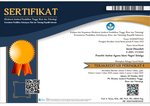Supervisi Akademik Berbasis Coaching untuk Meningkatkan Kinerja Guru SD Negeri Truko 02 Kecamatan Bringin
Abstract
This study aims to describe the implementation of academic supervision at SD Negeri Truko 02, Bringin District. The focus of the study includes: 1) the objectives of implementing academic supervision; 2) the principles of academic supervision with a coaching paradigm; 3) stages of implementing academic supervision; 4) supporting and inhibiting factors of academic supervision; and 5) efforts to overcome obstacles to academic supervision. This study is a qualitative study, the subjects of the study were the principal and teachers of SD Negeri Truko 02. Data were obtained through interviews, observations, and document analysis. In this study, the data analysis technique was inductive analysis. Data were analyzed through the following steps: data reduction, data presentation, and drawing conclusions. The results of the study: showed that: 1) the principal did not fully understand the meaning of the objectives of implementing academic supervision in schools; 2) the principles of partnership and continuity have not been implemented optimally; 3) Academic supervision is carried out in three stages, namely planning, supervision implementation, and follow-up. The cycle in clinical supervision includes 3 stages, namely Pre-observation, Observation and Post-observation; 4) Supporters of academic supervision are the existence of a supervision schedule, the willingness of teachers to be supervised, well-done teacher administration, and good collaboration between teachers. Factors inhibiting academic supervision are teachers who feel burdened when supervised, supervision schedules that sometimes clash, incomplete teacher administration, some teachers are not confident, teachers have the wrong perception, the principal's knowledge and understanding of academic supervision is not optimal, and time constraints; 5) to overcome these obstacles, the following are carried out: providing an understanding that academic supervision is a teacher's need, arranging an effective supervision schedule, utilizing free time to discuss teacher weaknesses in teaching.
Keywords
Full Text:
PDFReferences
Blackman, A., Moscardo, G., & Gray, D. E. (2016). Challenges for the theory and practice of business coaching: A systematic review of empirical evidence. Human Resource Development Review, 15(4). https://doi.org/10.1177/1534484316673177
Daresh, J. C. (2001). Supervision as proactive leadership. 3rd ed. Prospect Height, IL: Waveland Press
Depdiknas. (2007). Supervisi akademik: Panduan bagi kepala sekolah dalam meningkatkan mutu pembelajaran. Jakarta: Departemen Pendidikan Nasional.
Irsyati, M., Wijayanti, M. A., Puspitawati, S., Rafael, S., & Wijayanti, W. (2022). Modul 2.3 Angkatan 5 Reguler. Coaching untuk Supervisi Akademik. Jakarta: Kemendikbudristiek
Glickman, C.D., Gordon, S.P., and Ross-Gordon, J.M. (2007). Supervision and instructional leadership a development approach. Seventh Edition. Boston: Perason.
Goldhammer, R. (1969). Clinical supervision: Special methods for the supervision of teachers
Gormley, H., & Nieuwerburgh, v. C. (2014). Developing coaching cultures: A review of the literature. Coaching: An International Journal of Theory, Research and Practice, 7(2), 90101. https://doi.org/10.1080/17521882.2014.915863
Grant, A. M. (1999). Enhancing performance through coaching: The promise of CBT. Paper presented at the First State Conference of the Australian Association of Cognitive Behavior Therapy (NSW).
Ismiarti, D. R., Roesminingsih, Widodo, B. S. (2023). Supervisi Akademik Untuk Peningkatan Kinerja Guru dan Prestasi Belajar Siswa. Jurnal Ilmiah Mandala Education (JIME), 9(1). 10.58258/jime.v9i1.4760/http://ejournal.mandalanursa.org/index.php/JIME
Karsiem. (2015). Pelaksanaan Supervisi Akademik Dalam Peningkatan Kinerja Guru Sekolah Dasar Gugus III Sentolo Kulon Progo. Jurnal Akuntabilitas Manajemen Pendidikan, 3 (2), 201-212.
Kemendikbudristek. (2022). Coaching Untuk Supervisi Akademik. Jakarta: Direktorat Jenderal Guru dan Tenaga Kependidikan, Kementerian Pendidikan, Kebudayaan, Riset dan Teknologi
Kompri. (2014). Manajemen sekolah: Teori dan Praktik. Bandung: Alfabeta.
Lovell, J. T. (1980). Supervision for a better school. Prentice Hall.
Mendikbud. (2012). Pedoman penilaian kinerja kepala sekolah. Jakarta: Badan Pengembangan Sumber Daya Manusia Pendidikan dan Kebudayaan dan Penjaminan Mutu Pendidikan Pusat Pengembangan Tenaga Kependidikan
Miles, M. B., & Huberman, A. M. (1994). Qualitative data analysis: An expanded sourcebook (2nd ed.). Thousand Oaks, CA: Sage.
Mulyadi, & Fahriana, A. S. (2018). Supervisi Akademik. Malang: Madani.
Mulyasa, E., (2007). Menjadi kepala sekolah profesional. Bandung: PT Remaja Rosdakarya
Nawawi, H. (2003). Kepemimpinan mengefektifkan organisasi. Yogyakarta: Gajah Mada University Press
Republik Indonesia. (2003). Undang-Undang RI Nomor 20 Tahun 2003 tentang Sistem Pendidikan Nasional
Republik Indonesia. (2005). Undang-Undang Nomor 14 Tahun 2005, tentang Guru dan Dosen
Robbins, P. (2000). Peer coaching to enrich professional practice, school culture, and student learning.
Rosyadi, Y. I., & Pardjono, P. (2015). Peran Kepala Sekolah Sebagai Manajer Dalam Meningkatkan Mutu Pendidikan Di Smp 1 Cilawu Garut. Jurnal Akuntabilitas Manajemen Pendidikan, 3(1). https://Doi.Org/10.21831/Amp.V3i1.6276
Sugiyono. (2014). Memahami penelitian kualitatif. Bandung: CV Alfabeta.
Ulfatin, Nurul. (2015). Metode Penelitian Kualitatif di Bidang Pendidikan: Teori dan Aplikasinya. Malang: MNC Publishing.
Whitmore, J. (2009). Coaching for Performance: GROWing human potensial and purpose: Yhe principles and practise of choaching and leadership. London: Nicholas Brealey Publising
DOI: https://doi.org/10.18326/dinamika.v6i1.18-36
Refbacks
- There are currently no refbacks.
Copyright (c) 2025 Windah Lestari

This work is licensed under a Creative Commons Attribution-ShareAlike 4.0 International License.








